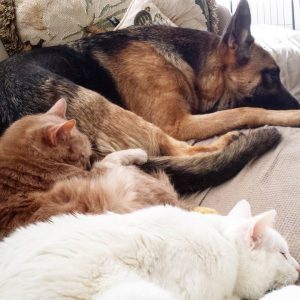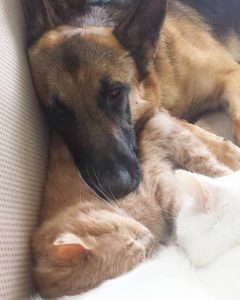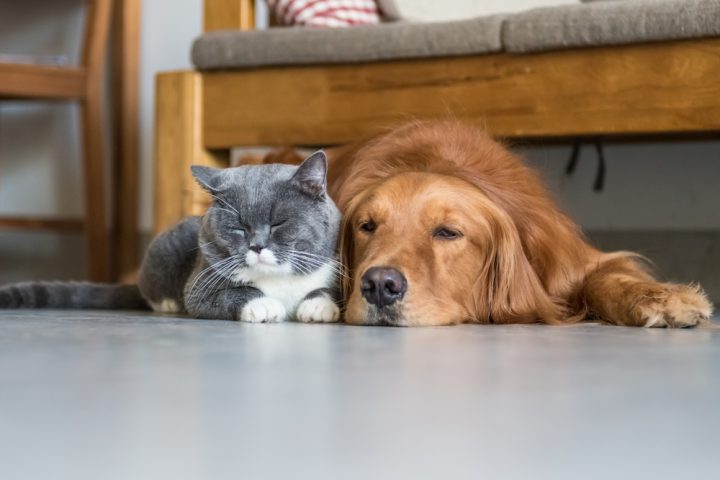There is a common misconception that many large god breeds are not capable of getting along with animals smaller than themselves, especially animals of the feline variety. As more and more households have both dogs and cats, many pet owners may be wondering if they are safe to add another four-legged friend to the family.
For those who already own large breed dogs, they may be wondering if it is OK for them to bring in a cat and there not be any incidents due to the breed of their dog and its natural instincts.
For those who have traditionally only had cats but are seeking to add a larger furry family member to their household, they may want more information on the best breeds to make sure they are choosing a pup that is likely to get along with Kitty.
So, which large dog breeds tend to be good with cats?
While it’s best to look at the individual dog and their relationship with cats, there are a few large breeds like Saint Bernard and Golden Retriever among others, who tend to get along better with cats than other large breeds. Proper socialization and training are a must, even with those breeds considered good with cats.
In the article below, we’ll take a look at 17 big dog breeds that have a tendency to be well-behaved around cats. We’ll also discuss how it’s important to look at additional factors such as breeding, upbringing, socialization and training history, and a dog’s individual personality when determining whether they get along with cats.
17 Large Dog Breeds That Are Good With Cats
It is important to remember that each dog is an individual and their socialization history plays a large role in whether they get along with cats, even if they are one of the breeds listed below.
Alternatively, some large breeds which are traditionally not considered good with cats may have individuals of those breeds who were properly socialized and trained to ignore cats, or they have a lower predatory drive than others in the breed.
Socializing dogs of any breed to cats and small animals when they are young puppies is the best way to help make sure both cats and dogs are kept safe and allows you to see if predatory drive will be an issue in your pup.
Obedience training and teaching good impulse control will also help teach your pup proper manners when interacting with cats.
Always pay attention to your individual dog to determine if they are safe with cats, regardless of their breed. It’s also wise to keep note of any changes in your dog’s behavior as they age to make sure they don’t develop any unwanted behaviors in their interactions with cats.
Dogs who are getting along with cats will either leave them be and interact with them very little, or they may be more affectionate with a cat and will lick them, groom them with a nibble, play with them, or even sleep with them. Dogs who do not get along with cats may chase them away, corner them, attempt to grab and shake them, or otherwise terrorize the cat in some way.
1. Alaskan Malamute
A working dog whose history lies in sled pulling, the Alaskan Malamute may be a surprising addition to this list as many breeds within the Spitz group of dogs do not tend to do very well with cats due to high prey drives.
The Malamute is often an exception to that “rule” as they tend to be a bit less excitable than other Spitz-type dogs. Provided they are socialized and taught good impulse control from a young age, it’s likely they will get along with any cats in your household.
Malamutes also have a reputation for being fairly gentle and amicable towards others, and they are considered an independent breed of dog which means they likely won’t pester Kitty for cuddling sessions (they’d much rather hang out with you!).
2. Bernese Mountain Dog
The Bernese Mountain Dog is well-known for its gentle nature, and this makes them a great choice for a household with cats.
As a working dog, some individuals may have a higher prey drive than others, but the majority tend to be good with animals of all shapes and sizes provided they are socialized and trained while young.
The biggest risk is a Bernie accidentally hurting a cat due to their larger size, either by accidentally stepping on them or by playing a little tough roughly. This is especially true of puppies, kittens, and senior or disabled cats, who often don’t know their own strength (or lack thereof) and where there is a greater risk of injury.
3. Boxers
Originally used for hunting and now mainly recognized as a playful family pet, the Boxer is another good choice for households with cats.
This high energy breed is incredibly affectionate, loyal, and intelligent. While some individuals can have a higher prey drive than others, many Boxers often do well with cats and other small animals if trained and socialized to them from a young age.
There is a caveat, though, in that the energetic and playful attitude of the Boxer can often lead to some unwanted interactions with a cat who’d rather be left alone or play in a much quieter way. Teaching your Boxer good impulse control and how to respect a cat’s space when they’ve said “enough” is important in keeping the peace between the two.
4. Doberman Pinscher
The steadfast and loyal Doberman Pinscher might be another surprise on this list of large dog breeds that tend to get along well with cats.
Originally utilized as a military and police dog, the Doberman of today can be seen anywhere and everywhere and is a popular choice for many dog sports. Dobermans almost always place their family first, and this can include feline companions within the household.
Their protective nature may cause issue with uninvited four-legged guests, but if a Dobie has been properly socialized and trained with cats from a young age then it is likely they will consider Kitty as one of their own.
5. German Shepherd
German Shepherds have built a reputation on their trainability, intelligence, and use in a variety of activities. They are also known to be great family dogs, and like the Doberman they will also usually consider any cat companions as part of their family.
As a herding breed, they do sometimes have a higher predatory drive, but their intelligence and ease of trainability means they can usually manage their impulse control provided they receive proper socialization and training from a young age.


My German Shepherds get along well with my cats, as you can see in the photos below!
6. Giant Schnauzer
The largest of the Schnauzer breeds, the Giant Schnauzer is a protective but playful breed of dog that is highly intelligent and capable of doing everything from household protection to farm work to police work.
Their tenacity and exuberance as puppies and young adults can be intimidating to some cats, but overall, the breed tends to get along with our feline companions.
As with all breeds, Giants do need to be trained and socialized to cats from puppyhood, and they will need plenty of energy outlets to keep them happy and healthy. Schnauzers with too much pent-up energy will become bored and may antagonize the cat and accidentally injure them in their efforts to play.
7. Golden Retriever
The Golden Retriever being on this list of large dog breeds that get along with cats should come as no surprise!
Goldens are famous for their loving and gentle nature, and that extends to the feline species as well. They are one of the few hunting breeds that can get along with small animals, and their predatory drives are generally low.
While most Golden Retrievers get along with cats, unfortunately, many unscrupulous breeders exist who want to capitalize on the breed’s popularity. This has led to some breeding lines being compromised and the results of those breedings are dogs with poor temperaments, hard mouths, and other behavioral and health issues.
Retrievers who come from poor breeding stock may have an increased risk of developing severe behavioral issues, and even those who come from good stock will still need early socialization and training to ensure that they get along with the family cat.
8. Great Dane
Despite their large size, Great Danes can be quite gentle with smaller animals.
These gentle giants do well with cats, though puppies and energetic adolescents need more guidance on appropriate play and interactions with cats to avoid any accidental injuries.
Training and socialization need to occur when Danes are puppies to help teach proper manners and good body control. Great Danes who do not receive this training tend to have poor impulse control, bite inhibition, and body awareness, which can result in accidental (or even purposeful) injuries to smaller animals, including cats.
9. Labrador Retriever
The Labrador Retriever has held the title of most popular dog breed since 1991 (though it was finally surpassed by the French Bulldog in 2022!), and for good reason.
Labs are well known for their friendliness and love of everyone and everything. They easily adapt to the role of family companions and trustworthy hunting dogs.
Their use as a sporting dog might make them seem like they wouldn’t get along with cats, but that couldn’t be further from the truth! Like Golden Retrievers, Labs are one of only a few hunting breeds that take well to cats provided their other physical and mental needs are met.
Labs tend to have a soft mouth (some can even carry eggs without breaking them!) and they are easily trainable, so as long as they have been socialized with cats from puppyhood there should be no issue keeping a Labrador and a cat in the same household.
10. Leonberger
Like the Bernese Mountain Dog, Leonbergers are another family-oriented giant dog breed.
They also tend to get along quite well with cats with proper socialization and training. These gentle and even-tempered dogs thrive in family environments, and they enjoy companionship from humans, canines, felines…pretty much anyone!
Due to their large size caution should be taken if you have a rambunctious youngster (puppy or kitten) or an elderly or disabled cat to avoid accidental injuries.
11. Newfoundland
Another gentle giant, the Newfoundland is historically considered a guardian of the sea and worked on ships and in water rescue. They are still used today in water-based Search & Rescue operations.
This large breed of dog is known to be gentle with kids, cats, and animals of all kinds. Their relaxed and loving nature makes them an ideal choice for households with cats, but care should still be taken with teaching impulse control and body awareness, so an excited Newfie doesn’t accidentally step on Kitty.
12. Rottweiler
The Rottweiler is another large breed of dog that, when exposed to cats as puppies, will tolerate them as adults. These hearty breeds may seem scary, but underneath that intense gaze is a loveable goofball who just wants to be with his family.
Rotties are known to think they are much smaller than they actually are, so it’s best if you have a larger adult cat rather than a kitten who might be stepped on or a senior cat who is not able to get away as quickly.
But if your Rottweiler is taught impulse control and his energy needs are met, then it’s likely he’ll get along with any feline companions in his household.
13. Saint Bernard
An iconic giant, the Saint Bernard is one of the largest dog breeds and one of the gentlest breeds. Despite their large size, they are known to be very aware of their bodies and most are naturally gentle with things smaller than them (including cats and children).
As with any dog, Saint Bernard’s require proper socialization and training as puppies as even they can develop behavioral issues that are not normal for the breed as a whole. In general, though, they are excellent choices for households with cats or other small animals.
14. Standard Poodle
Like their smaller counterparts, the Standard Poodle is a good choice for a large breed dog that gets along well with cats.
Did you know that the Standard Poodle is considered a hunting breed? They were traditionally used to hunt ducks! Nowadays this intelligent, confident, and athletic dog is found everywhere from the show ring to the agility ring.
Their intelligence and trainability make them a great choice for cat-loving households as they can pick up quickly on what’s allowed versus not allowed when it comes to their feline companions.
Many Standard Poodles are also much more interested in hanging out with their owners rather than pestering the family cat.
15. Collie (Rough & Smooth)
The beautiful Collie (both the Rough and Smooth coated varieties) is considered one of the smartest breeds of dogs and for good reason!
These loyal, sensitive, and family-focused herding dogs are capable of doing a wide range of activities and they tend to pick up on new things very quickly. Despite being a herding breed, they tend to leave cats alone provided they are properly socialized and trained from a young age, and they have their needs met on a daily basis.
The Collie is also one of the few herding dogs that can go from 100 to 0 (“active working dog” to “couch potato”) with only minor prompting from their owners.
This makes them one of the best large breed dogs to have in cat-friendly households as they are very responsive to cues from their owners, and they don’t let their natural instincts overpower that responsiveness.
16. Great Pyrenees
Considered one of the best and most popular Livestock Guardian breeds, the Great Pyrenees is a hardworking and intelligent large breed dog.
While they show no tolerance for predators and occasionally other dogs, they are known to be quite gentle and accepting of animals smaller than them, including cats.
During puppyhood, they must be socialized and taught proper manners, but if this is undertaken and there are no other behavioral issues present in the dog due to poor breeding, then they will almost always get along with (and can be trusted with) cats of all shapes, sizes, and health conditions.
17. English Setter
Last, but certainly not least, is the English Setter.
Another sporting dog and a popular choice for gun dog enthusiasts, the English Setter is a gentle, amicable, and naturally curious breed of dog.
Unlike many other gun dogs, the English Setter thrives on home life and does best when around her family. While they have a high predatory drive, they tend to focus on birds and small game such as squirrels, and most can be taught quite easily to leave the family cat alone.
Closing Thoughts
There are many, many large breed dogs that get along with cats out there. Even some large breeds of dogs who are not traditionally considered “cat friendly” may be OK with cat-loving households if they are socialized and trained from a young age, and their natural instincts have proper outlets.
But if you are looking to add a cat to your large breed household, or if you are wanting to add a big dog to your feline household, then the breeds on this list might be a good starting point for your research.

